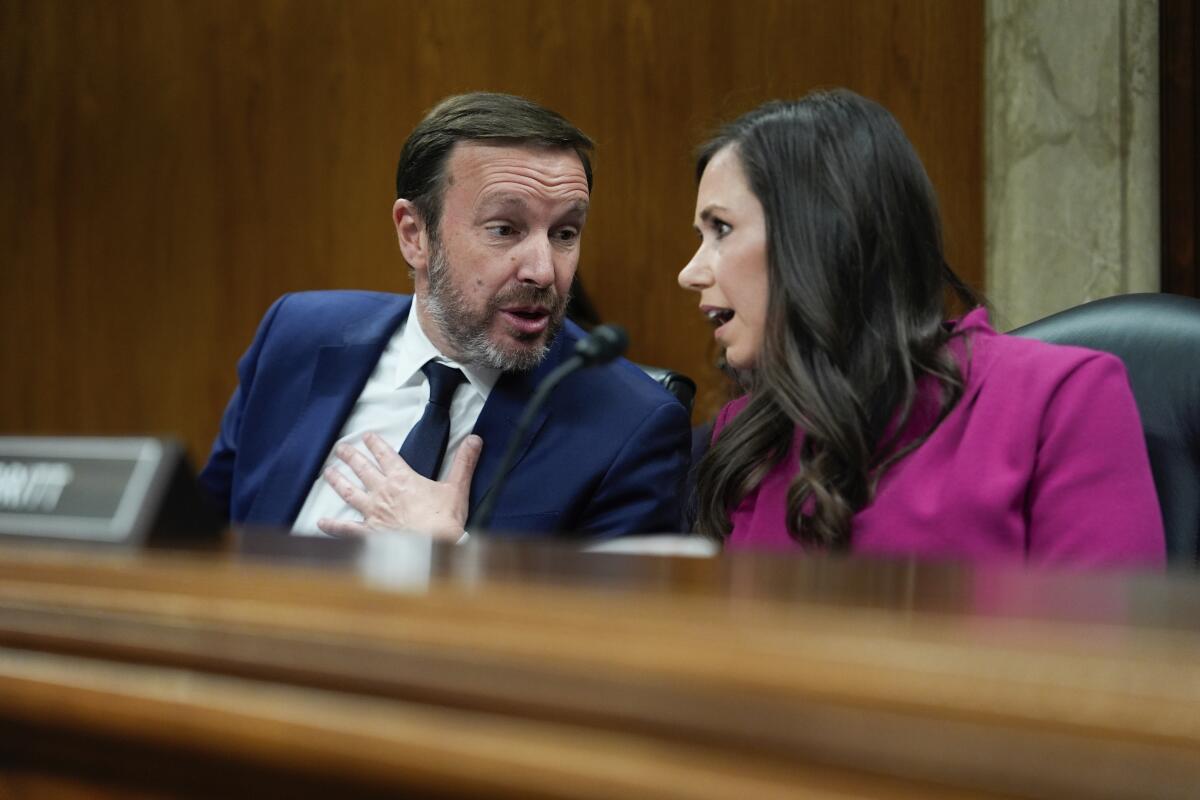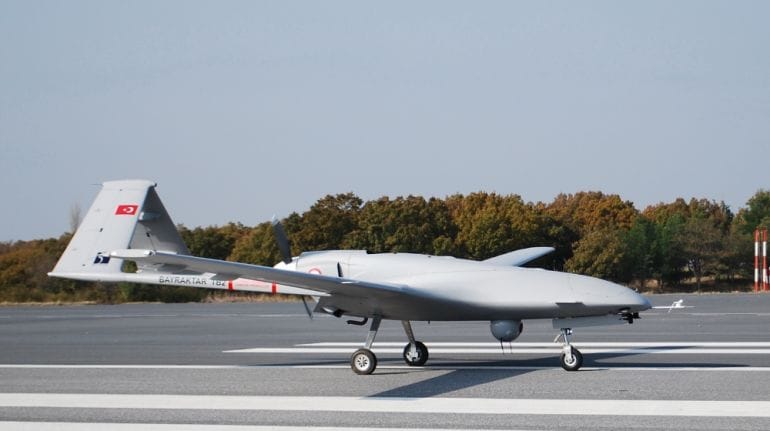Trump accepting luxury jetliner from Qatar raises alarm on both sides of political aisle
President Trump has spent the first major overseas trip of his second administration — next stop Wednesday in Qatar — beating back allegations that he was personally profiting from foreign leaders by accepting a $400-million luxury airliner from the Gulf state’s royal family.
Trump has bristled at the notion that he should turn down such a gift, saying he would be “stupid” to do so and that Democrats were “World Class Losers” for suggesting it was not only wrong but also unconstitutional.
But Democrats were hardly alone in criticizing the arrangement as Trump prepared for broad trade discussions in Doha, the Qatari capital.
Several top Republicans in Congress have expressed concerns about the deal, including that the plane would be a security risk. Senate Majority Leader John Thune (R-S.D.) on Tuesday said there were “lots of issues associated with that offer which I think need to be further talked about,” and Sen. Shelley Moore Capito (R-W.Va.), another member of the Republican leadership team, said that Trump and the White House “need to look at the constitutionality” of the deal and that she would be “checking for bugs” on the plane, a clear reference to fears that Qatar may see the jetliner as an intelligence asset.
Criticism of the deal has even arisen among the deep-red MAGA ranks. In an online post echoed by other right-wing influencers in Trump’s orbit, loyalist Laura Loomer wrote that while she would “take a bullet for Trump,” the Qatar deal would be “a stain” on his administration.
The broad outrage in some ways reflected the stark optics of the deal, which would provide Trump with the superluxury Boeing 747-8 jumbo jet — known as the “palace in the sky” — for free, to be transferred to his personal presidential library upon his departure from office.
Accepting a lavish gift from the Persian Gulf nation makes even some stolid Trump allies queasy because of Qatar’s record of abuses against its Shiite Muslim minority and its funding of Hamas, the militant group whose attack on Israel touched off a prolonged war in the region.
Critics have called the deal an out-and-out bribe for future influence by the Qatari royal family, and one that would clearly come due at some point — raising serious questions around the U.S.’ ability to act with its own geopolitical interests in mind in the future, rather than Qatar’s.
Trump and Qatar have rejected that framing but have also deflected questions about what Qatar expects to receive in return for the jet.
White House Press Secretary Karoline Leavitt, in response to detailed questions from The Times, said in a statement that Trump “is compliant with all conflict-of-interest rules, and only acts in the best interests of the American public — which is why they overwhelmingly re-elected him to this office, despite years of lies and false accusations against him and his businesses from the fake news media.”
Leavitt has previously said it was “ridiculous” for the media to “suggest that President Trump is doing anything for his own benefit,” because he “left a life of luxury and a life of running a very successful real estate empire for public service, not just once, but twice.”
Ali Al-Ansari, media attache at the Qatari Embassy in Washington, did not respond to a request for comment.
Beyond the specific concern about Qatar potentially holding influence over Trump, the jet deal also escalated deeper concerns among critics that Trump, his family and his administration are using their political influence to improperly enrich themselves more broadly — including through the creation of a $Trump cryptocurrency meme coin and a promised Washington dinner for its top investors.
Experts and other critics have for years accused Trump of violating constitutional constraints on the president and other federal officials accepting gifts, or “emoluments,” from foreign states without the express approval of Congress.
During Trump’s first term, allegations that he was flouting the law and using his office to enrich himself — including by maintaining an active stake in his golf courses and former Washington hotel while foreign dignitaries seeking to curry favor with him racked up massive bills there — went all the way to the Supreme Court before being dismissed as moot after he’d been voted out of office.
Since Trump’s return to office, however, concerns over his monetizing the nation’s highest office and the power and influence that come with it have exploded once more — and from disparate corners of the political landscape.
Sen. Chris Murphy (D-Conn.), left, speaks with Sen. Katie Britt (R-Ala.) during a Senate Appropriations Subcommittee on Homeland Security oversight hearing on May 8, 2025, on Capitol Hill in Washington.
(Julia Demaree Nikhinson / Associated Press)
In a speech last month on the Senate floor, Sen. Chris Murphy (D-Conn.) alleged dozens of examples of Trump and others in his family and administration misusing their positions for personal gain — what Murphy called “mind-blowing corruption” in Trump’s first 100 days.
Murphy mentioned, among other examples, the meme coin and dinner; corporations under federal investigation donating millions to Trump’s inaugural fund and those investigations being halted soon after he took office; reports that Trump has sold meetings with him at his Mar-a-Lago resort in Florida for millions of dollars; and Donald Trump Jr.’s creation of a private Washington club with million-dollar dues and promises of interactions with administration officials.
Murphy also noted Trump’s orders to fire inspectors general and other watchdogs meant to keep an eye out for corruption and pay-to-play tactics in the federal government, and his scaling back of laws meant to discourage it, such as the Foreign Agents Registration Act, the Foreign Corrupt Practices Act and the Corporate Transparency Act.
“Donald Trump wants to numb this country into believing that this is just how government works. That he’s owed this. That every president is owed this. That government has always been corrupt, and he’s just doing it out in the open,” Murphy said. “But this is not how government works.”
When news of the Qatar jet deal broke, Murphy joined other Democratic colleagues on the Senate Foreign Relations Committee in a statement denouncing it.
“Any president who accepts this kind of gift, valued at $400 million, from a foreign government creates a clear conflict of interest, raises serious national security questions, invites foreign influence, and undermines public trust in our government,” the senators wrote. “No one — not even the president — is above the law.”
Other lawmakers — from both parties — have also weighed in.
Sen. Adam Schiff (D-Calif.) blasted Trump’s acceptance of the plane as his “lastest con” and a clear attempt by the Qatari government to “curry favor” with him.
“This is why the emoluments clause is in the Constitution to begin with. It was put in there for a reason,” Schiff said. “And the reason was that the founding fathers wanted to make sure that any action taken by the president of the United States, or frankly any other person holding federal public office, wasn’t going to be influenced by getting some big gift.”
Sen. Rand Paul (R-Ky.) said in an interview with MSNBC on Monday that he did not think it was a “good idea” for Trump to accept the jet — which he said wouldn’t “pass the smell test” for many Americans.
Experts and those further out on the American political spectrum agreed.
Erwin Chemerinsky, dean of UC Berkeley School of Law and an expert in constitutional law, said the gift of the jet, “if it is to Trump personally,” clearly violates a provision that precludes the president from receiving any benefit from a foreign country, which America’s founders barred because they were concerned about “foreign governments holding influence over the president.”
Richard Painter, the top White House ethics lawyer under President George W. Bush, said that Trump accepting the jet would be unconstitutional. And he scoffed at the ethics of doing business with a nation that has been criticized as having a bleak human rights record.
“After spending millions helping Hamas build tunnels and rockets, Qatar has enough to buy this emolumental gift for” Trump, Painter wrote on X. “But the Constitution says Congress must consent first.”
Painter criticized the White House justifying the deal by saying that Atty. Gen. Pam Bondi had “signed off” on it, given Bondi’s past work for the Qatari government, and said he knew of no precedent for a president receiving a lavish gift without the approval of Congress. He noted that Ambassador Benjamin Franklin received a diamond-encrusted snuff box from France’s King Louis XVI, but only with the OK from Congress.
Robert Weissman, co-president of the progressive nonprofit Public Citizen, said that it was unclear whether Trump would heed the cautionary notes coming from within his own party, but that the Republican-controlled Congress should nonetheless vote on whether the jet was a proper gift for him to receive.
“If the members of Congress think this is fine, then they can say so,” Weissman said, “and the voters can hold them accountable.”
Daily Wire co-founder Ben Shapiro, a prominent backer of Trump, criticized the deal on his podcast Monday, saying that Trump supporters would “all be freaking out” if Trump’s predecessor, Joe Biden, had accepted it.
“President Trump promised to drain the swamp,” Shapiro said. “This is not, in fact, draining the swamp.”



